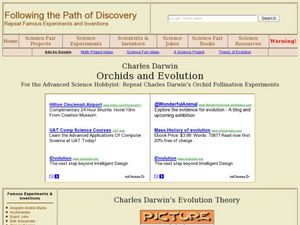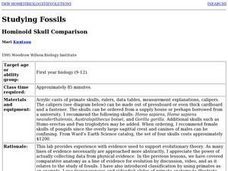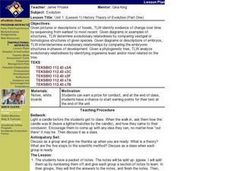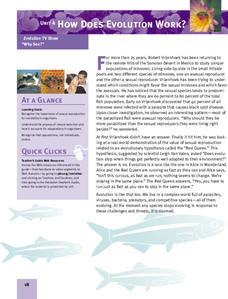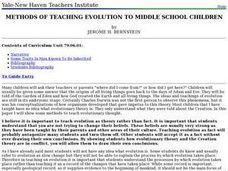Curated OER
Comparing Theories: Lamarck and Darwin
Students compare the evolution theories of Lamarck and Darwin. They use self-assessment and a video to increase their knowledge of evolution theories. They research questions and present them to the class.
Curated OER
The History of the Theory of Evolution
Students research the history of the theory of evolution and make a comparative timeline of events in world history and in the history of evolutionary theory.
Curated OER
Evolutionary Exchange
Young scholars discuss the difference between designed and natural elements. After reading an article, they discover information about current controversies in evolutionary science. In groups, they research and write dialogues between...
Curated OER
The Effect of Natural Selection on Genes, Traits and Individuals
Rotating through five stations, evolutionary biologists explore the question of how changes in DNA facilitate the changes in a population over time. High-quality, colorful cards of animals, skeletons, skulls, and DNA sequences can all be...
Curated OER
Evolution and the Fossil Record
Engage young biologists with four laboratory activities that explore the fossil record. Learners examine fossil images, a fossil kit, the rock record, and geologic time scale. They even experiment with the oxygen production of an Elodea...
Curated OER
Gaia: The Wisdom of the Earth
Learners are introduced to Gaia theory of natural homeostasis. They graph Earth's temperatures over time, construct terrariums or monitor the outdoor environment. Related videos titles are suggested, but may be outdated. The objectives...
Curated OER
Human Origins: The Prehistoric Human Race
When it comes to the origin of the human species young scholars are full of misconceptions. Clear up the hominid confusion with this evolutionary activity focused on assisting students in understanding prehistoric man and his family...
Curated OER
Orchids and Evolution
Students study Charles Darwin's evolutionary theory and how he applied it to orchids. In this evolution lesson students repeat Darwin's orchid pollination experiment.
Curated OER
What Is Your Explanation for the Evidence?
Students encounter an interactive computer program activity designed as a diagnostic of student beliefs related to the theory of evolution. Students process the Hypercard cascades structured around a set of biological topics related to...
Curated OER
Pandemics and Epidemics
High schoolers evaluate data related to population growth, along with problems and soultions: disease cvontrol. They are able to explain how changes in habitat may affect organisms. Students evaluate evolutionary theories and processes.
Curated OER
Charles Darwin's Hardware Shop
Using an assortment of hardware, junior biologists explore the theory of evolution. They consider how simple pieces of hardware might be changed into similar items and display their discoveries on a poster. The lesson would be...
Curated OER
Investigating Evolutionary Questions: Bats, Whales, Reptiles, Birds, Animal Classification
Students are guided through a process in which three questions are addressed by retrieving beta hemoglobin sequences from online databases, and using online tools to compare those sequences in student-selected animals.
Curated OER
Studying Fossils: Hominoid Skull Comparison
High schoolers collect data on the differences in Hominid skulls using acrylic casts of fossil skulls. They measure a series of structures on skulls from six different species then use the data to determine evolutionary relationships...
Curated OER
What Is the Nature of Science?
Students distinguish between scientific and everyday meanings of key words-theory, hypothesis, law, fact-and use in context. They recognize the variables that affect observation, data collection, and interpretation. They discover the...
Curated OER
Modeling Earthquake Data
Learners evalute evolutionary theories and processe of Geology. They examine evidence that the movement of continents has had signicicant global impact, major geological events. Students evaluate the forces which shape the lithosphere...
Curated OER
History Theory of Evolution
Students identify fossils. They identify evidence of change over time when given pictures of fossils to determine the proper sequencing. In addition, they determine evolutionary relationships by comparing embryonic structures.
Curated OER
Creative Ways To Teach Evolutionary Concepts
Students explore evolutionary concepts in cartoons and lab activities. They describe and explain evolutionary concepts featured in a cartoon and participate in laboratory activities.
Curated OER
Molecular Approaches to Evolution
Young scholars examine the molecular studies of organisms that have led to a new era in their understanding of speciation and evolutionary relationships. Students study the allelic frequency of genes controlling specific molecules and...
Curated OER
Examining the Fossil Record
Students create an evolutionary tree based on fossil morphology and their ages. In this fossil record lesson plan, students are given 23 pictures of fossil. They study their morphology and arrange the fossils by age and structures on a...
Curated OER
Why Do People Fall in Love?
Students discuss human behavior, sexual selection and the underlying genetic and evolutionary reasons for mate selection. The, in groups, they rate the attractiveness of certain individuals and measure facial features for symmetry.
Curated OER
How Does Evolution Work?
Students are introduced to how the process of evolution works. As a class, they review the characteristics of natural selection and how those with advantageous traits reproduce and survive. To test this theory of natural selection,...
Curated OER
Hominoid Skull Comparison
Young scholars are provided with evidence used to support evolutionary theory. They are introduced to classification by using primates as an example. Students read article related to Hominoid Skull Comparison and write a summary about...
Curated OER
Methods of Teaching Evolution To Middle School Children
Students study evolutionary thought. They examine how characteristics are inherited and that they are a source of variation. They illustrate the perpetuation, elimination, and variation made among members of a species. They determine...
Curated OER
What did T. rex taste like?
Students examine the three domains of life and explain that all living things share a common ancestor. In this paleontology lesson students are introduced to the process of illustrating evolutionary relationships.







